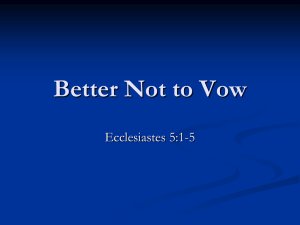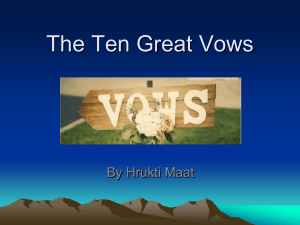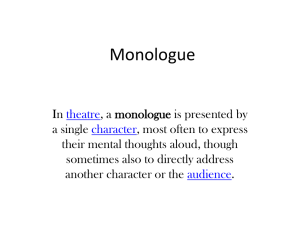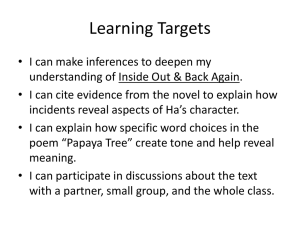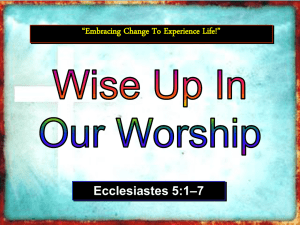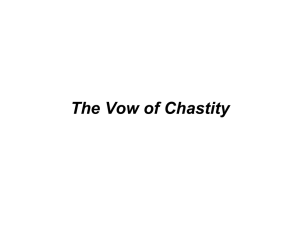File - Spiritoflife.net
advertisement
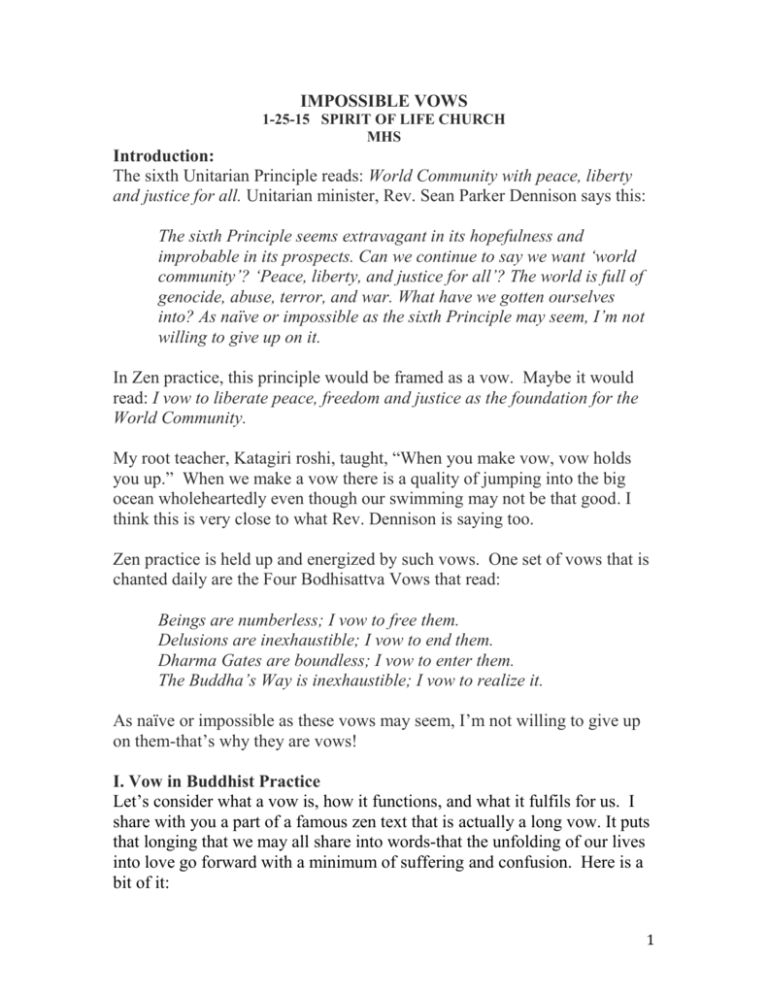
IMPOSSIBLE VOWS
1-25-15 SPIRIT OF LIFE CHURCH
MHS
Introduction:
The sixth Unitarian Principle reads: World Community with peace, liberty
and justice for all. Unitarian minister, Rev. Sean Parker Dennison says this:
The sixth Principle seems extravagant in its hopefulness and
improbable in its prospects. Can we continue to say we want ‘world
community’? ‘Peace, liberty, and justice for all’? The world is full of
genocide, abuse, terror, and war. What have we gotten ourselves
into? As naïve or impossible as the sixth Principle may seem, I’m not
willing to give up on it.
In Zen practice, this principle would be framed as a vow. Maybe it would
read: I vow to liberate peace, freedom and justice as the foundation for the
World Community.
My root teacher, Katagiri roshi, taught, “When you make vow, vow holds
you up.” When we make a vow there is a quality of jumping into the big
ocean wholeheartedly even though our swimming may not be that good. I
think this is very close to what Rev. Dennison is saying too.
Zen practice is held up and energized by such vows. One set of vows that is
chanted daily are the Four Bodhisattva Vows that read:
Beings are numberless; I vow to free them.
Delusions are inexhaustible; I vow to end them.
Dharma Gates are boundless; I vow to enter them.
The Buddha’s Way is inexhaustible; I vow to realize it.
As naïve or impossible as these vows may seem, I’m not willing to give up
on them-that’s why they are vows!
I. Vow in Buddhist Practice
Let’s consider what a vow is, how it functions, and what it fulfils for us. I
share with you a part of a famous zen text that is actually a long vow. It puts
that longing that we may all share into words-that the unfolding of our lives
into love go forward with a minimum of suffering and confusion. Here is a
bit of it:
1
Eihei Koso Hotsuganmon
Verses on Arousing the Vow by Eihei Dogen Zenji- 13th C CE
Although our past evil karma has greatly accumulated, indeed being
the cause and condition of obstacles in practicing the Way, may all
Buddhas and Ancestors who have attained the Buddha Way be
compassionate to us and free us from karmic effects, allowing us to
practice the Way without hindrance.
So even centuries ago, people felt as we do; we have inner obstacles to deal
with in order to fulfill our vows, and that sometimes the obstacles seem
endless and insurmountable. So we call out loud for help-even in Zen. We
call on enlightened beings and our ancestors. This is deeply human. When
we make a vow, an impossible vow, we need special help.
Vows energize our spiritual curiculuum, and the curiculuum has two aspects.
One aspect is the wish to realize God, or, to put it another way- that the
separation we feel from each other and from life is an illusion. Realizing the
true nature of this life that is truly beyond conception is both the call to
awaken, and the fruit of that call. We name this aspect: Practice.
The other aspect is Vow. Another way we might say this is that vow isactivity. This activity is special because it is motivated by our understanding
of the nature of God and beings. We could say that this is the engagement of
the transcendent with the relative in our day- to - day lives. It is our work
with justice and our caring for the world.
To vow is to make a promise in a deep and dignified way. Sometimes we
make formal promises in our lives. Marriage or commitment ceremonies are
the most prominent examples of these.
Vowing requires and brings forth some special and specific conditions:
When we vow we have to discriminate between self and other in
order to do it. We need to be aware of this as we’re doing it.
Whatever promise we may make, there is some inherent tension in it
because making a vow is basically impossible. Thus we should be
slightly suspicious of ourselves when we make a vow.
The vow we make matters to others-this helps us understand our
vow.
2
A vow needs to be witnessed by: Great beings/God; Respected
persons; our own self-respect and honor. To be fulfilled, a vow
requires witnessing and this requires community.
II. Bodhicitta (Awakened Mind)
Arousing our Bodhicitta mind is particularly stressed in Tibetan Buddhism.
This arousal has two main components, the Relative and the Absolute.
The Relative aspects are: a. The intention and wish, nurtured by limitless
compassion, to attain liberation for the sake of the welfare of all beings. and
b. The actual entry into meditation, the purpose of which is the acquisition
of appropriate means to actualize this wish. The appropriate means is the
realization of the……Absolute: The vision of the true nature of phenomena.
Joseph Goldstein, a western Vipassana teacher, quotes a Tibetan yogi named
Shapkar, who says about Absolute and Relative Bodhicitta: "The mind's
nature is vivid as a flawless piece of crystal: Intrinsically empty, Naturally
radiant, Ceaselessly responsive."
As Rev. Dennison notes, because the vow to bring peace to the world
community is so outrageous, we have to arouse tremendous
understanding and love to continuously attempt to do it. One of the
ways that this is cultivated in Buddhist practice is to work with little
bitty prayer phrases such as:
BODHICITTA GATHA / DESIRE TO AWAKEN PHRASE
May my precious heart's desire
Bloom where it has not been seen;
May the blossoms' blessed fire
Arise and free all suffering beings.
[Story of Robert Baker/Clarence at O’Hare Jan. 5th]
The Guesthouse -by Rumi
This being human is a guesthouse.
Every morning a new arrival.
3
A joy, a depression, a meanness,
some momentary awareness comes
as an unexpected visitor.
Welcome and entertain them all!
even if they're a crowd of sorrows,
who violently sweep your house
empty of its furniture,
still, treat each guest honorably.
He may be clearing you out
for some new delight.
The dark thought, the shame, the malice,
meet them at the door laughing,
and invite them in.
Be grateful for whoever comes,
because each has been sent
as a guide from beyond.
III. Four Bodhisattva Vows
The sixth Unitarian Principle is expressed in these four vows. They also
could be seen as naïve and impossible, especially because they are
predicated on Absolute Bodhicitta. But because this is so, they are even
more enticing and inspiring.
Beings are numberless; I vow to free them.
Delusions are inexhaustible; I vow to end them.
Dharma Gates are boundless; I vow to enter them.
The Buddha’s Way is inexhaustible; I vow to realize it.
“In Taking the Path of Zen, the American Zen Buddhist Robert Aitken
wrote, “Nobody fulfills these ‘Great Vows for All,’ but we vow to fulfill
them as best we can. They are our path.” We are able to access the energy
of the “path” because that great longing that Rumi mentions all the time, is
part and parcel of who we are as human beings. It’s natural, but we are not
often given the tools to use its energy, and we will have to take up the tools,
learn to use them, and then use them, over and over again. In doing this, we
learn to refine the art of contributing to the creation of a World Community
with peace, liberty and justice for all.
[CPE group-vowing to save all beings…]
4
The realization of “Emptiness” gives me the balance and energy to continue
to lean to refine the activities of these vows. This is the important spiritual
point that rests in the Mahayana Zen view of realizing non-clinging to the
notion of beings as concrete objects outside of “myself”.
[Reference the practice Clarence gave me.]
With this embodied understanding functioning in our heart and minds, there
is space in the suffering and confusion we hope to influence towards
peace. There is the understanding that myriad conditions gave rise to the
daily news, that in some way these stories could not be otherwise. However,
if I, in my wish to help to relieve this pain, see the beings and the traumatic
stories as concrete objects, I cannot not even approach relieving suffering.
So, I would say, that there are not beings at all; there is no one to save; and
there is no enlightened state from which I operate to save them.
This is very hard to comprehend when we use words. But when we don’t
use words and we are simply the activity of responding ceaselessly, there is
no problem.
Here is Thich Nhat Hanh’s translation of the Four Bodhisattva Vows:
However innumerable beings are, I vow to meet them with kindness
and interest.
However inexhaustible the states of suffering are, I vow to touch them
with patience and love.
However immeasurable the Dharmas are, I vow to explore them
deeply.
However incomparable the mystery of interbeing, I vow to surrender
to it freely.
In Thay’s translation, the instructions for fulfilling these vows are implicit in
the language that he gives us. It is an endless investigation, returning,
reflecting, and re-efforting.
Conclusion:
I found this teaching from Zen teacher David Riley at his blog-“The Endless
Further”:
5
The hidden teaching within Mahayana Buddhism that it is more
important to practice the Way of the Bodhisattva than it is to become
a Buddha. The Way of the Bodhisattva is the Way of the Buddha.
However, people often miss this point and think that enlightenment is
the ultimate goal. There is no goal, there is only the path, and it is a
path of compassion, and everything in Buddhism leads up to this one
simple truth.
A word that works as a handle for me regarding this view is: ungraspable.
In the Jewish tradition, the word for G-d, cannot be pronounced. My sense
is that this is because G-d is ungraspable. The vision that the sixth principle
puts forth is an expression of focused Bodhicitta, and it is, essentially,
ungraspable. Yet, we can do no other but walk in its pathways.
In a work attributed to Nagarjuna, The Transcendental Bodhicitta Treatise,
{(c. 150 – c. 250 CE) is widely considered one of the most important
Buddhist philosophers after Gautama Buddha.[2] Nāgārjuna is also credited
with developing the philosophy of the Heart Sutra, the foundational text of
Mahayana Buddhism.},
it reads:
The essential nature of all Bodhisattvas is a great loving heart, and
all living beings constitute the object of their love . . . They are like the
beautiful lotus-flower, which rises up from the swamp, its blossoms
unsullied by the mud. Their great hearts of compassion, which
constitute the essence of their being, never leave suffering creatures
behind in their journey. Their spiritual knowledge is in the emptiness
of all things, but their work of salvation is never outside the world of
suffering.”
Prayer:
May we all be nourished by the beauty of this longing. May we be nurtured
by emptiness. May we walk together with all beings in a World Community
fostered in peace, liberty and justice with all.
6
7
